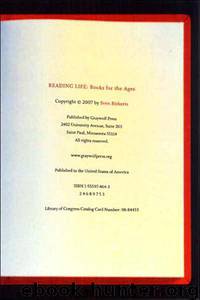Reading Life: Books for the Ages by Sven Birkerts

Author:Sven Birkerts [Birkerts, Sven]
Language: eng
Format: epub
ISBN: 1555974643
Publisher: Graywolf Press
Published: 0101-01-01T00:00:00+00:00
I want to stay near this business of voice, the particular spanning of outer and inner that Bellow has fashioned to such a high art. For the voice was a big part of what so affected me in my most recent reading of the novel. Indeed, this time through I was less caught up in the tragedy of Humboldt, or the comedic Chicago set pieces, or even the romantic travails that were so piercing to me the first time. Older, I was most taken with Bellow’s rendering of Charlie as a man floundering in time, a man in search of the larger synthesis.
In my earlier readings of the novel I missed the importance of the fact that Charlie was a middle-aged man not just living his life, but even more significantly, re-living it. But this is—I would say mercifully—the blindness of youth. Young, we cut the cloth of the world to our own feelings and understandings. To me, back then, Charlie was, as had been Emma Bovary before him, just an adult of indeterminate adult status. I had no way of grasping him otherwise. I hadn’t, certainly when I was first reading Humboldt, experienced the wonderful and terrible ways in which as we get older the film of our own lives increasingly doubles over on itself, returning us to things we had thought safely buried, recirculating old poisons, throwing the glare of hindsight down onto choices made . . . Well, now I know. And this time in my reading it clicked for me. I grasped— felt—the extent to which the work is—and I don’t think the comparison is that far-fetched—Bellow’s Inferno. Charlie is a man awakening to himself in the middle of a dark wood and finding that the straight way* has become lost. Where Dante is allegorical, Bellow is often hammy and oblique, full of comic and ironic impulses. But the overall feeling of the work is still one of often sorrowful retrospection. And the ultimate thrust is transformational—the point is to show us a man who goes into his darkness to wrestle his devils, and who finally comes through.
The core confrontation is, of course, with memories of his younger self, especially of his friendship with Humboldt and what he must face there: his own egotism, his fear of the decline and failure Humboldt represented, and the fact that he deserted the poet in his time of need. The relationship is complex, and Humboldt from his side acted unpardonably toward Charlie, taking advantage of his loyalty in a dozen different ways. That Humboldt drifted in and out of delusion only partially exonerates him. Charlie had good reasons for pulling away from his friend in the end.
But these reasons and explanations only satisfy on the psychological plane. Charlie in middle age is determined to break through to a higher spiritual apprehension of things, and from his new vantage—when he can attain it—he sees the past very differently. Tormenting and manipulative as his friend was, he was also, over and
Download
This site does not store any files on its server. We only index and link to content provided by other sites. Please contact the content providers to delete copyright contents if any and email us, we'll remove relevant links or contents immediately.
| Booksellers & Bookselling | General |
| History of Books |
4 3 2 1: A Novel by Paul Auster(12358)
The handmaid's tale by Margaret Atwood(7734)
Giovanni's Room by James Baldwin(7307)
Asking the Right Questions: A Guide to Critical Thinking by M. Neil Browne & Stuart M. Keeley(5745)
Big Magic: Creative Living Beyond Fear by Elizabeth Gilbert(5731)
Ego Is the Enemy by Ryan Holiday(5398)
The Body: A Guide for Occupants by Bill Bryson(5067)
On Writing A Memoir of the Craft by Stephen King(4921)
Ken Follett - World without end by Ken Follett(4711)
Adulting by Kelly Williams Brown(4556)
Bluets by Maggie Nelson(4536)
Eat That Frog! by Brian Tracy(4503)
Guilty Pleasures by Laurell K Hamilton(4428)
The Poetry of Pablo Neruda by Pablo Neruda(4083)
Alive: The Story of the Andes Survivors by Piers Paul Read(4013)
White Noise - A Novel by Don DeLillo(3993)
Fingerprints of the Gods by Graham Hancock(3980)
The Book of Joy by Dalai Lama(3963)
The Bookshop by Penelope Fitzgerald(3829)
